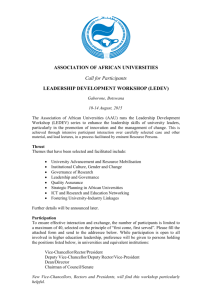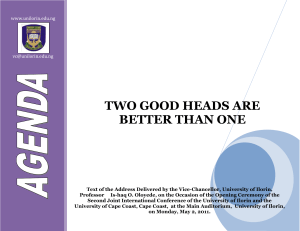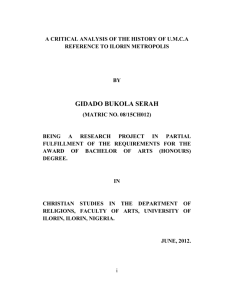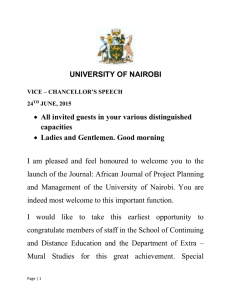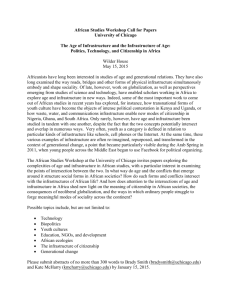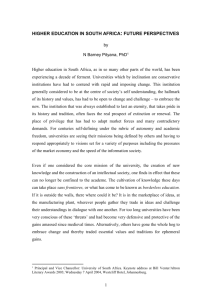right step in the right direction
advertisement
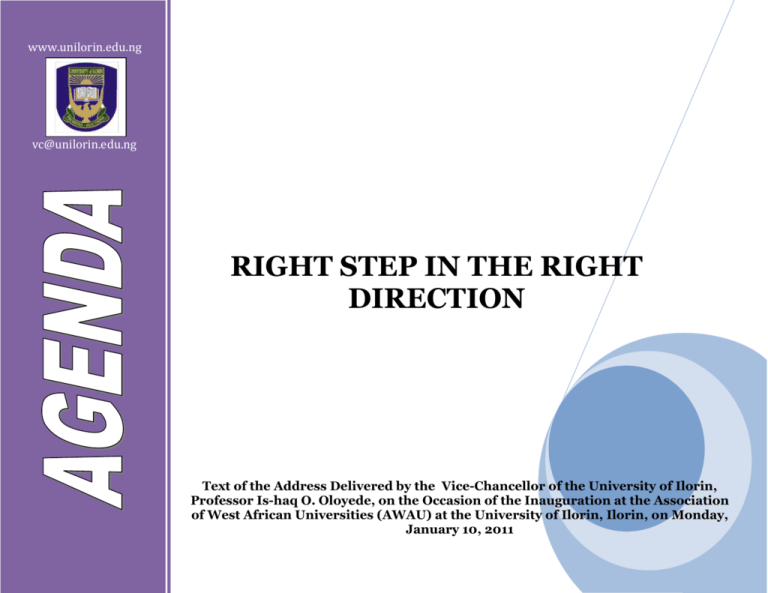
www.unilorin.edu.ng vc@unilorin.edu.ng RIGHT STEP IN THE RIGHT DIRECTION Text of the Address Delivered by the Vice-Chancellor of the University of Ilorin, Professor Is-haq O. Oloyede, on the Occasion of the Inauguration at the Association of West African Universities (AWAU) at the University of Ilorin, Ilorin, on Monday, January 10, 2011 A RIGHT STEP IN THE RIGHT DIRECTION It is our immense joy and pleasure to welcome you all to this momentous occasion. I wish to especially, on behalf of the Council, Senate, management, staff and students of the University, welcome the distinguished world citizens, past and current Vice-Chancellors of West African Universities to the University of Ilorin. I think it is just apposite that we are all converging here in Kwara, particularly the historic city of Ilorin, which is the confluence between the North and the South of the country, for this historic occasion. I warmly welcome you and wish you a happy and memorable stay in our dear University and community. Distinguished ladies and gentlemen, permit me to start by saying that one irrefutable reality of today is that the world has shrunk from its Friedmanian large size to a tiny size on account of globalization, a term Ruud Lubers conceives as “a process in which geographical distance becomes a factor of diminishing importance in the establishment and maintenance of cross-border economic, political and social-cultural relations.” In other words, I think Thomas Friedman is apt in his The World is Flat (2005) by identifying three great eras of globalization. According to him, globalization 1.0 (1492-1800) shrunk the world from a large size to a medium size, with the linking of the New World and the Old World by Columbus, globalization 2.0 (c.18002000) occurred when national companies made the world shrink from a medium size to a small size; and globalization 3.0 (around 2000, still unfolding) is shrinking the world from a small size to a tiny size witnessed now in the dynamic force which is the power of individuals to compete and collaborate, irrespective of geographical boundaries. As done in Europe which responded to globalization 3.0 with strategic geo-political collaboration resulting in the formation of the European Union and the creation of a common currency, Euro, and elsewhere, the dominant challenge of this era, if I may restate, is to associate, integrate, collaborate and network. It is against this background that I think our meeting today is long overdue and the formation of AWAU should have come before now. I say this because similar university associations exist in other regions of Africa. For instance, there are the Middle East and North Africa Association for Institutional Research (MENA-AIR), Southern African Regional Universities Association (SARUA) and The Inter-University Council for East Africa 1 (IUCEA) for Northern, Southern and Eastern regions of Africa respectively. While acknowledging the old maxim that it is better late than never, I believe that our regional Universities are taking a bold step, indeed a right step in the right direction, through this meeting of you great minds. If God’s time is the best as it is, we are assured that it is God’s plan that AWAU heralds the second decade of this decisive century in our region. I hope this will be a beginning of great things in the University system of our sub-region which profoundly shares many things in common. It will also deepen at the intellectual level what the Economic Community of West African States (ECOWAS) should be committed to at the political and economic levels. Distinguished ladies and gentlemen, it is well known, just as the immediate past Secretary General of the Association of African Universities (AAU) and former Vice-Chancellor of the University of Mauritius, Prof. Goolam Mohamedbhai, puts it, that there are challenges: “African universities face enormous challenges.... Africa inherited a higher education system that was a carbon copy of (that of) the powers that colonised it. Right from the beginning, Africa started on a wrong footing – well behind the starting line so to speak.” In a similar vein, it is agreeable that, as Chris Brink, Vice-Chancellor of Newcastle University, United Kingdom, and former head of Stellenbosch University in South Africa, submits, “the trajectory of higher education in Africa, particularly sub-Sahara, is quite depressing, and the prognosis is not particularly good. Nor is the situation helped by the developed world mining Africa for human resources just as efficiently as it has been mining it for natural resources.” (See Phil Baty’s “No Contest” (2010) at http:/www.timeshighereducation.co.uk/world-university-rankings/2010-2011/Africa.html) However, my little problem with these fine submissions and others like them is that we cannot afford to keep on lamenting. I believe, as I stated in Abuja on May 8 2009, at the end of the 12 th Conference of the Association of African Universities, that “it is not enough in our present age to lament How Europe Underdeveloped Africa a la Walter Rodney, it is rather crucial that we direct our energies towards how Africans can “super-develop” Africa...” and that “the problems confronting Africa can be addressed if there is cooperation with one another, learning from one another and supporting one another.” 2 This meeting should serve as another golden opportunity for us as West African universities to work more together in order to address our common challenges. As such, I take it as a right step in the right direction that we are meeting even if it is “behind the starting line” compared with other regional bodies and I hope that through constant engagement, we shall be able to solve our regional problems through our own intellectual resources especially when they are pooled together. Unity is strength and collaboration is key. Distinguished and eminent academics, I wish you a pleasant stay at the University of Ilorin and I wish us happy deliberations on the strategies of raising our regional university system to a higher pedestal. Once again, you are heartily welcome. Thank you very much for your attention. 3
